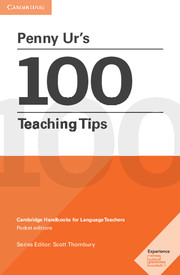Book contents
- Frontmatter
- Contents
- Why I Wrote this Book
- Beginning and Ending the Lesson
- The Coursebook
- Discipline
- Error Correction
- Games
- Grammar
- Group Work
- Heterogeneous (Mixed-Level) Classes
- Homework
- Interest
- Listening
- Pronunciation
- Reading Comprehension
- Speaking Activities
- Teacher Talk
- Testing and Assessment
- Vocabulary Teaching
- Writing
- P.S.
- Index
- Photo Acknowledgements
Vocabulary Teaching
Published online by Cambridge University Press: 17 November 2023
- Frontmatter
- Contents
- Why I Wrote this Book
- Beginning and Ending the Lesson
- The Coursebook
- Discipline
- Error Correction
- Games
- Grammar
- Group Work
- Heterogeneous (Mixed-Level) Classes
- Homework
- Interest
- Listening
- Pronunciation
- Reading Comprehension
- Speaking Activities
- Teacher Talk
- Testing and Assessment
- Vocabulary Teaching
- Writing
- P.S.
- Index
- Photo Acknowledgements
Summary
The importance of vocabulary teaching is generally recognized these days, and there's been a lot of research on how best to teach it. This section includes some references to key studies.
89 Teach a lot of vocabulary
90 Teach multi-word chunks
91 Sometimes teach out of context
92 Do plenty of review
93 Use mother tongue to explain
89 Teach a lot of vocabulary
Vocabulary is the most important thing to teach: you can't even begin to express yourself without knowing the forms and meanings of words.
When I started teaching I was told: ‘Don't bother about teaching vocabulary, they’ll pick it up, grammatical patterns are the priority’ (this was the heyday of audiolingualism).
Big mistake! Huge!
It's essential to teach a lot of vocabulary in class as soon as possible. You need grammar, of course, as well – I’m not saying don't teach grammar. But much more time should be devoted to deliberate vocabulary teaching and review: I’d say about a third of lesson time in elementary and intermediate classes and not much less in advanced ones.
It appears that a large sight vocabulary (words you can immediately and automatically understand when you see them) is the main condition for successful reading comprehension. Grammar, background knowledge and reading strategies are less important. Vocabulary is also the basis of listening comprehension, and, of course, of speaking and writing.
The size of vocabulary needed for reading and understanding unsimplified texts has been estimated as something like 8,000 words (see the reference below). That's an enormous number, difficult to grasp. Let me put it like this: assuming an academic year of about 30 weeks, it means learning at least 30 words a week for eight years. And that doesn't take into account the learning of lexical chunks (see Tip 90) and the need for review (see Tip 92).
You can't expect students just to pick up all this vocabulary from their reading. Incidental learning of vocabulary from reading happens of course, but it's relatively slow, and most students in English courses simply don't read enough to enable them to reach the levels of knowledge indicated above. We need to teach vocabulary in class.
- Type
- Chapter
- Information
- Penny Ur's 100 Teaching TipsCambridge Handbooks for Language Teachers, pp. 105 - 110Publisher: Cambridge University PressPrint publication year: 2016

